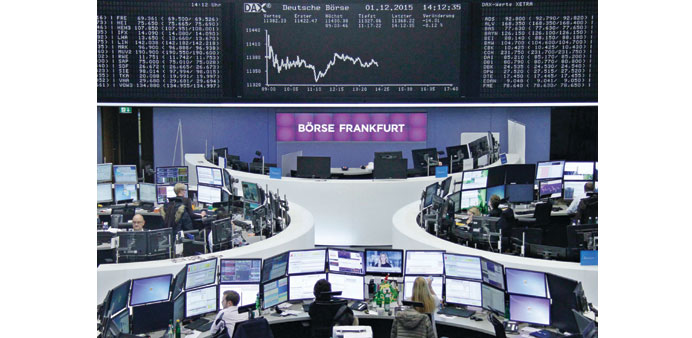Traders work at their desks in front of the DAX board at the Frankfurt Stock Exchange. Both Frankfurt and Paris shed around 1% yesterday.
AFP
London
Upbeat eurozone data, notably on jobs, failed to cast off market wariness as traders waited for further hints on any fresh European Central Bank stimulus this week.
Both Frankfurt and Paris shed around 1% while Spain and Italy joined the continental downward drift with small falls despite strong economic data.
In contrast, London gained 0.6% as the Bank of England said Britain’s seven top lenders passed its latest stress tests, boosting the financial sector.
Paris and Frankfurt had risen on Monday on expectations ECB chief Mario Draghi would unveil fresh economic stimulus on Thursday in the form of more quantitative easing (QE).
Data showed yesterday that factory growth in the euro area accelerated amid a continued decline in unemployment, extending a tepid recovery.
Markit Economics said its Purchasing Managers Index (PMI) for the eurozone rose to 52.8 in November from 52.3. A reading over 50 indicates expansion.
Eurozone unemployment meanwhile hit its lowest level for nearly four years in October, beating analyst expectations and confirming a slow recovery in Europe’s job market.
The EU’s Eurostat agency said unemployment in the 19-country bloc fell to 10.7% in October, the lowest level since January 2012.
In Germany unemployment fell to its lowest level since the country’s reunification in 1990.
While Frankfurt dipped 0.3%, trade was contrasted amid a 16.5% gain for power giant RWE, hit hard by government plans to phase out nuclear power and fossil fuels, after it announced plans to spin off its renewables, grids and retail operations and take the unit public as “a platform for growth.”
But gas and engineering firm Linde lost 14.3% following a profit warning blamed on macroeconomic conditions and low oil prices.
In foreign exchange activity, the euro edged back from Monday’s low of $1.0558 —which was the weakest level since mid-April to $1.0620.
The ECB is expected tomorrow to ramp up its trillion-euro asset purchases and cut key rates to counter weak inflation, analysts said.
The eurozone’s inflation rate stood at zero in October, climbing out of negative territory but remaining far below the ECB’s target of about 2.0%.
The ECB launched in March a €1.1tn ($1.2tn) scheme to help lift consumer prices. The QE programme to buy sovereign bonds runs until at least September 2016.
In contrast, the US Federal Reserve is widely expected later this month to raise interest rates for the first time in almost a decade.
Wall Street moved ahead on the eurozone data with the Dow Jones Industrial Average adding 0.5%.

